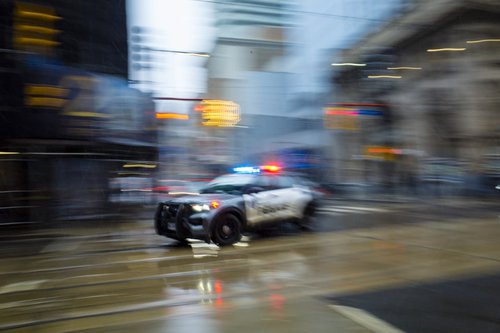What To Do If You Get Pulled Over by Ontario Police

When driving the streets and highways of Ontario, the last thing you want to see in the rear-view mirror is flashing blue lights. If you’re looking through the side mirror, those blue lights may be “closer than they appear,” but they’re going to catch up to you unless you decide to make a run for it.
Naturally, the criminal defence lawyers of TorontoDUI would advise you against such a rash move. The consequences will likely be more severe than they would have had you taken the correct lawful action of pulling your vehicle over to the side of the road to come to a safe stop. Of course, we’re assuming for this exercise that you are generally a law-abiding person who has not just robbed a bank, gunned down a romantic rival, or is in the process of transporting 50 kilos of cocaine for Greater Toronto Area distribution.
Assuming the former, let’s examine what you — the law-abiding person you are — should do if you get pulled over by the Ontario Provincial Police, the RCMP, Toronto Police, or any other legal entity with flashing blue lights.
Legal Reasons Police Can Pull You Over
In Canada, police have the lawful authority to stop and detain anyone based on a reasonable belief that they are committing, recently committed, or are about to commit an offence. This reasonable belief must be evidence-based, as an officer must justify the legality of the stop if the case goes to trial. An officer’s suspicion or sense that something wasn’t right typically doesn’t pass muster with a judge, who will dismiss charges if the stop was unlawful.
The Criminal Code, Ontario Highway Safety Act (OHSA), and court precedents provide police additional authority to make stops. They give police broad discretion to stop any driver to check them for potential impairment by alcohol or drugs. This includes stopping drivers at random or planned checkpoints, a practice upheld by the Supreme Court of Canada. Police are also authorized to conduct stops to check for a valid driver’s license, vehicle registration, and proof of insurance. Under the OHSA, police are granted authority to stop any driver for any suspected traffic violation, which constitutes the majority of police stops.
Your Rights Under Canadian Law if Stopped by Police
Mainly based on the Canadian Charter of Rights and Freedoms, you have distinct rights that police are obliged to abide by if they pull you over. These rights include:
- Right to Remain Silent — if stopped, you do not have to answer any questions posed by police beyond providing your name, address, and date of birth.
- Right to Legal Representation — you have the right to speak to a lawyer before answering any questions.
- Right to Know the Reason for the Stop — police are generally trained to advise drivers of the reason behind a stop but, if they fail to do so, must explain the reason for the stop if asked.
- Right to Privacy — police cannot search you or your vehicle without a warrant, your consent, or a reasonable belief that you or the vehicle possesses evidence of a crime. Absent the “reasonableness” of this belief, in court, a judge would likely rule the search unlawful and disallow any uncovered evidence. That said, if police have pulled you over for a criminal offence or significant traffic violation like DUI, the police can usually come up with a reasonable reason for the search. For example, if you’re suspected of impaired driving, police can search for evidence of drinking or drug use. Police can also conduct a pat-down search for weapons or evidence if they place you under arrest.
- Right to Be Informed of the Charges — if police place you under arrest, they must tell you what charges you are facing and inform you of your right to consult a lawyer.
- Right to Record Your Interaction with Police — the police cannot legally prevent you from recording their actions; however, there is often a thin line between recording and potentially interfering with the police officer’s performance of their duty.
Pointers to Help Ease the Stress of a Police Stop
While the sight of blue flashing lights and subsequent interaction with police often seems stressful, know that it’s stressful for them, too. When police pull a driver over or stop a vehicle at a checkpoint, they don’t know what they might be getting into. Sure, you might be a law-abiding citizen, but for all the police know, you’re transporting 50 kilos of coke and carrying an assault rifle to protect your load. To ease the stress for both you and them during a stop, we offer you the following pointers.
- When you see those flashing blue lights slow down and start looking for a safe place to pull over. If a breakdown lane or other safe spaces seem limited, slow down a bit more and engage your emergency flashers to let the officer know that you are trying to comply.
- Once you find a safe stopping space, make sure you engage your turn signal to let the officer know you are coming to a stop.
- When you stop, turn off your engine. Leaving your motor running could suggest that you might decide to make a break for it. Oh, and if you’ve left it on, turning it off will be one of the first things the officer requests of you.
- If you’ve been pulled over at night, turn on your overhead interior light. Because of limited visibility, police generally find nighttime stops to be the most stressful. By turning on your overhead light, the officer can see inside the vehicle, which can help ease their potential stress.
- Whether day or night, try to refrain from making too many movements within the vehicle. Excessive movements may suggest that you’re hiding contraband or seeking a weapon. Drivers often reach into the glove box or armrest console for their registration and insurance information, but don’t make an extended search for it until the officer asks for it.
- You and your passengers should remain in the vehicle. If you have a legitimate reason for needing to exit the vehicle while on the side of the road, ask for permission first.
- Roll your window down all the way, preferably before the officer gets there and taps on the glass. If it’s excessively cold, you can wait until you see them exit their vehicle from your side- or rear-view mirror.
- While you have the right to remain silent, being polite and respectful goes a long way in defusing stress. You can say hello, identify yourself, and answer questions that you are positive have no relevance to the reason for the stop. From a legal standpoint, be silent about any information that might incriminate you for any perceived or alleged offences. i.e., don’t say something like, “Yes, I was going over the speed limit, but…” or “I only drank two margaritas, and that was three hours ago.”
- Should you disagree with any allegations made by police regarding the reasons for the stop, do not try to argue your way out of it.
- If an officer asks you to exit the vehicle, comply with that request and cooperate with any other reasonable directives.
- Should an officer make a demand for roadside alcohol or drug screening or a field sobriety test, know that the penalties for refusing this demand are the same for a DUI if convicted.
If the Police Stop Results in a DUI, Contact TorontoDUI
We trust that this article will help you successfully navigate any experience you have with flashing blue lights in your rear-view mirror. Should a police stop result in DUI-related charges, we suggest you contact us for a robust impaired driving defence. With more than 15 years of success in defending thousands of Greater Toronto Area clients from DUI-related charges, contact TorontoDUI for a free consultation.
